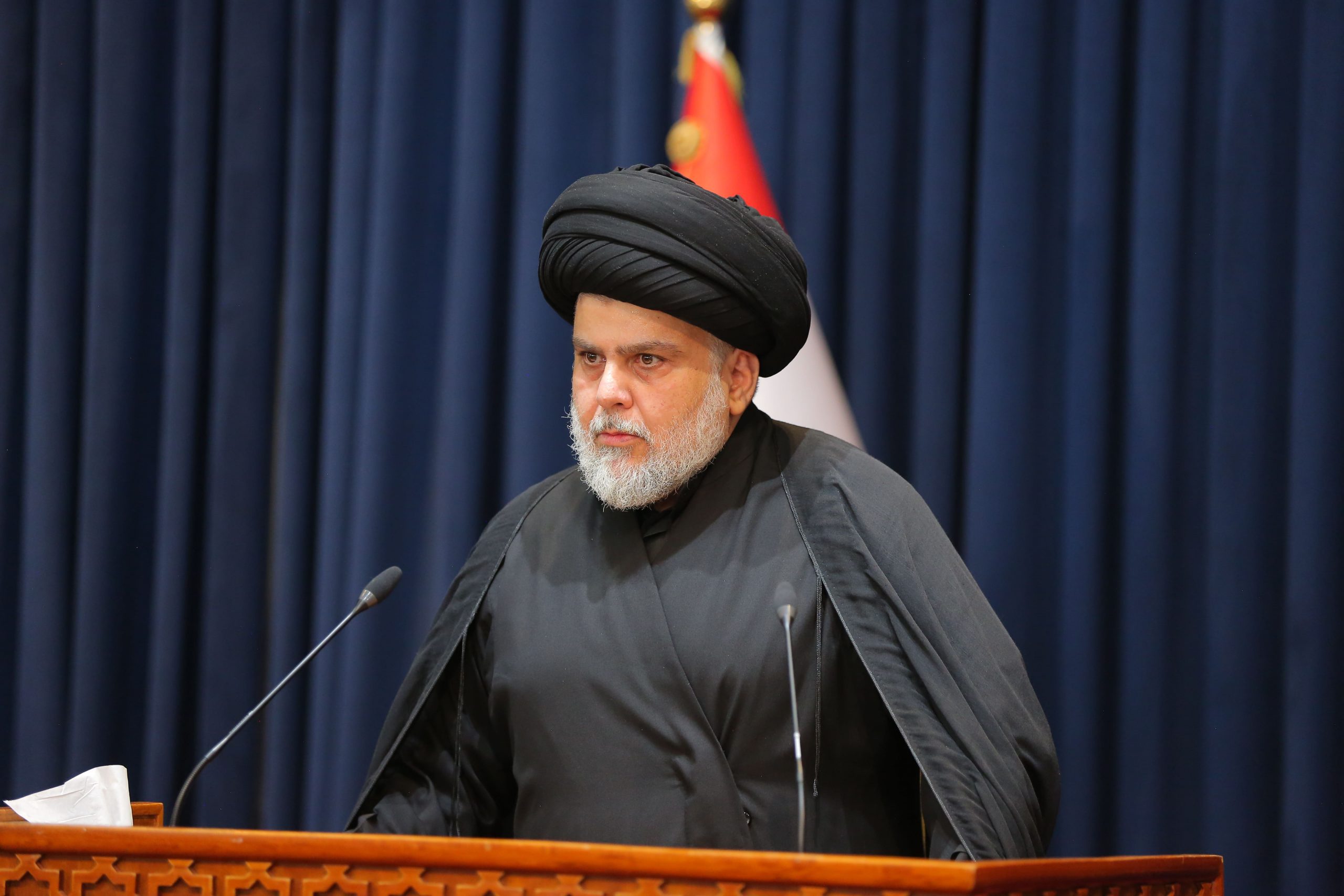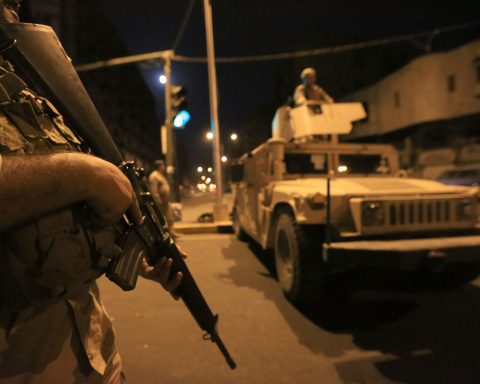The ongoing power struggle between rival Shia factions turned into bloody street violence in Iraq. The deadly violence began in Baghdad’s streets right after the announcement of mercurial Shia cleric Muqtada al-Sadr’s withdrawal from politics on August 29. The announcement came shortly after Qom-based Grand Ayatollah Kazem Husseini al-Haeri announced his resignation as a marja taqlid, a top ecclesiastical authority and source of emulation in the Shia community.
As a spiritual leader of the Sadrist movement, Haeri urged his followers to support Iran’s supreme leader, Ali Khamenei. Seeking to promote Iraqi nationalism and oppose Iranian influence in the Arab-majority country, Sadr is capable of increasing his political influence over Iraqi politics. However, the psychological factors behind his repeated announcements of quitting politics re-displayed how Sadr is stuck in between being a decision-maker in politics and pursuing his family path to be a religious authority.
Sadr as a cleric
Haeri accused Sadr, though implicitly without pronouncing his name, of lacking real wisdom in being a political leader and a religious leader -unable to follow his family legacy. Taking the significance of the religious dimension for the Sadrist circle, Haeri’s statement is considered to have a negative effect on the inner world of Sadr who claimed that his withdrawal from politics was based on religious motivations.
Haeri was mentored by Sadr’s late uncle, Grand Ayatollah Mohammad Baqir al-Sadr (1935-80) -one of marja in Iraq. Moreover, Haeri was reportedly described as the ” most knowledgeable of all” by Sadr’s father (1943-99), Grand Ayatollah Mohammad Mohammad Sadeq al-Sadr – another influential marja. Considering Sadr has not become a marja yet since he needs to meet various educational and religious requirements, after the death of his father, Haeri appointed Muqtada as his representative in Iraq and gained his legitimacy. However, despite being a spiritual leader of a significant number of people in the Sadr movement, it is no secret that Haeri has had serious disagreements with Sadr for many years. Therefore, being the main actor who has recently frozen parliamentary politics and led the street opposition in Iraq, Muqtada al-Sadr’s ultimate goal is to seek ways of being a marja, or at least a credible religious figure in the Iraqi Shia community.
Despite the lack of marja requirements and governmental experience, Sadr managed to create a controversial career in religious and political authority in recent years. However, building a career on the legacy of his father and uncle, his inadequacy in the religious field has always been an Achilles heel for Sadr. As a matter of fact, Haeri’s call that Khamenei should be followed is considered an attempt to deprive Sadr’s religious power. Thus, there may be small breaks due to the spiritual commitment within the movement. Also, Iran-backed Iraqi groups may press against Sadr even more because of the relative lack of religious authority he has fallen into. Even carrying out propaganda activities in order to harm Sadr’s legitimacy would not be surprising.
Taking the fact that the Sadrist movement has never had a single religious authority after the death of Grand Ayatollah Sadeq al-Sadr, the movement’s older generation mainly followed Haeri, Grand Ayatollah Mohammed Hussein Fadlallah, who moved to Lebanon, or Grand Ayatollah Mohammed Ishaq al-Fayadh, who was based in Najaf. Also, a considerable number followed Iraq’s biggest Shia religious authority in Najaf, Grand Ayatollah Ali al-Sistani. Considering that young Sadrists are not familiar with Haeri well, his criticisms about Sadr may make Haeri a persona non grata among them.
Sadr is also torn between the religious competition of Qom and Najaf, the two main hawzas for Shia theological education and different understandings of Shia theology in Iran and Iraq, respectively. It would be an exaggeration to expect Sadr to break the bridges with Iran, which has embraced him at certain times in the past. However, considering the Iraqi nationalism and anti-Iran sentiment that he has adopted at the discursive level in recent years, Sadr’s turning more towards Najaf may increase Sadr’s legitimacy among Iraqi Shiites. As a matter of fact, the allegations that Sistani intervened in Sadr’s recent policy of escalating street tension are considered a gesture for Sadr. Indeed, the possibility of Sadr movement members following Qom will strengthen Iran’s hand against Najaf in the medium term, as it seeks to strengthen its influence in the Najaf hawza. Despite the possible death of Sistani, which means a breaking point for Shiism in Iraq, Sadr, who is not expected to become a marja and cannot replace Sistani, can create his religious authority through his social base. It would not be a surprise if Sadr, who is stated to have been continuing his theological studies since 2014, declared himself as a religious authority. Particularly, the allegiance of his followers to Sadr, who is famous for his unpredictable moves, is a facilitating factor in the realization of this possibility.
Sadr as a political leader
Emerging on Iraq’s political scene during the brutal US invasion in 2003 and exerting his family credentials and popularity to garner support from poor Iraqi Shias, Sadr has been the decision maker in the political field in recent years. Despite resigning from the parliament in June, the Sadrists managed to become the single largest bloc in the parliament, represented by 73 MPs in the October 2021 election. Sadr’s refusal to compromise with pro-Iranian Shiite groups in the government formation talks deepened the division among Shiites in Iraq.
The Iran-backed Shiite Coordination Framework obtained authorization to form a government after Sadrists withdrew from parliament after Sadrists failed to do so for 11 months. However, Sadr followed an attitude of not allowing any other party to form a government and adopted street politics. When the Coordination Framework moved to hold a parliamentary session on July 30 to push through its prime minister candidate, Sadrists stormed the parliament and stopped the work of the parliament. Then, taking steps to disrupt the state administration, Sadr intervened in Iraq’s Federal Supreme Court and rendered the judiciary dysfunctional.
The fact that Haeri’s stepping down as a religious authority intersects with a highly tense period for Iraq and Iran indicates that it was not a decision independent of the tension between Sadr and pro-Iranian groups. With this move, Tehran seems to have aimed to push Sadr into despair against the pro-Iranian groups’ restriction of movement by freezing politics and his dissatisfaction with Iran’s rising hegemony in Iraq. However, it is crystal clear that these moves by Iran would not overthrow or intimidate a politically ambitious leader like Sadr.
Flip-flopping breeds irrationality
Sadr’s last announcement to quit politics came at a particularly tense moment. Sadr, who was toing and froing between the religious and political leadership, raised the threat of conflict in the country from the civilian level to the elite-administrative level. Sadr’s tantrums, which proved his capacity to start and end a civil conflict within one-day on August 29, resulted in the deaths of 30 people. The unexpected decisions he made in this process slightly enfeebled Sadr. Several senior Sadrists are heard criticizing the movement’s leader in audio recordings leaked on social media. However, unlike other Iraqi politicians, he apologized for his wrong decisions: “I apologize to the Iraqi people for the clashes that took place.” Some claim that his ability to apologize makes him privileged and reinforces his power in the eyes of his followers.
Sadr is eager to combine religious authority derived from his ancestry with his political power. Having religious credentials and political power gives him the motivation to be the absolute Shia ruler of Iraq. However, his political influence can only go so far in terms of religious power. Sadr, who seemed to lack the discipline to gain the academic-based Shiite religious authority he desired, proved that he had no patience as someone who had resigned from politics many times. Particularly, taking a balance of terror in the country, in which weapons are activated the moment the political mechanism is out of the way, Sadr’s torn between being a religious or political leader complicates the political stalemate in the country. Indeed, no sign appears on the horizon that Sadr would give up on either of them.














